By Jacqueline Vaughn
Indian Country – at least in northern Arizona – is like a small nation. The Four Corners region, along with the Zuni Pueblo, Supai, and Hopi lands, has its own languages, customs, roads, law enforcement, and governments.
When it comes to animal control and welfare, the Navajo Nation Animal Control and Navajo Nation Veterinary Management are by all accounts, insufficient to handle the hundreds of thousands of dogs, cats, horses, sheep, and other creatures that roam the vast landscape.
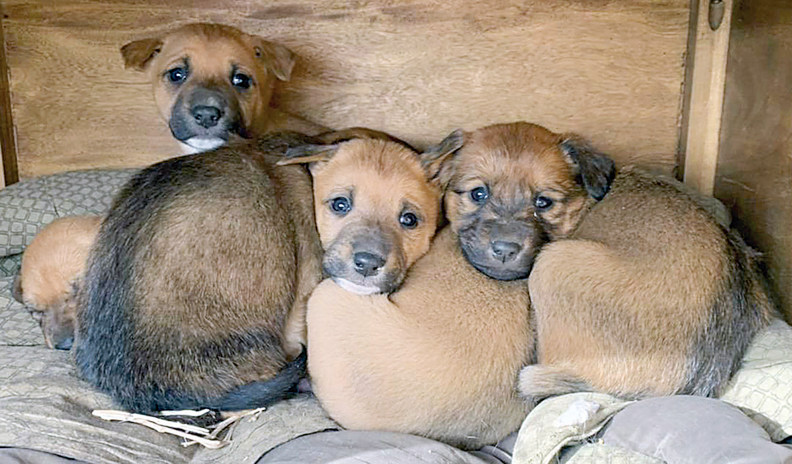
The COVID-19 pandemic, or Dikos Nstaigii-19, has further reduced resources available for services such as spaying and neutering animals, controlling strays, and routine veterinary care. On the Navajo Nation, Emergency Order 2020-04 directed residents, with the exception of essential services, to stay at home to protect public health. The high number of deaths on reservation lands also led to weekend closures and the shutdown of programs or curbside service.
The already limited presence of out-of-area rescue organizations was sometimes actually cut off, with clinics canceled and volunteers taking their chances while breaking tribal curfews. Vehicle travel between adjoining states became more limited with weekend closures, although some rescuers found ways around the new COVID regulations by using back roads and asking their Native American friends for help.
While the pandemic has certainly had an impact on veterinary services, the leaders of the vast Navajo Nation have never seriously prioritized animal welfare. For a number of reasons that are both cultural and economic, tribal officials have opened (and then closed) veterinary clinics, done roundups of stray animals in communities like Kayenta, and, despite the promise of providing “low cost, quality veterinary services to the Navajo People,” the Navajo Nation’s Animal Control and Veterinary Management Program has been inadequate.
There is really no “adoption program” operated by the tribal government, and with only a handful of working kennels, animals that are rounded up are almost immediately destroyed.
One 2017 report estimated that an estimated 10,000 animals a year are being destroyed on the Navajo Nation, although it is hard to verify that number. Unfortunately, it is almost impossible to get any accurate statistics on the scope of the pet overpopulation problem in this region. Visits to Navajo Nation websites will often produce unsatisfying results, with out-of-date or incomplete information. Calls, letters, or emails to tribal officials may not be answered or returned.
As a result, out of area organizations have stepped up with different approaches and varying levels of resources to do what Native American leaders have failed to do themselves. The pandemic has sometimes limited travel to many areas within Indian Country and has led some groups in nearby states to consider alternatives to their usual rescue routines.
Without these non-profit organizations stepping up to help animals in need, the numbers killed would be considerably higher.
Soul Dog Rescue
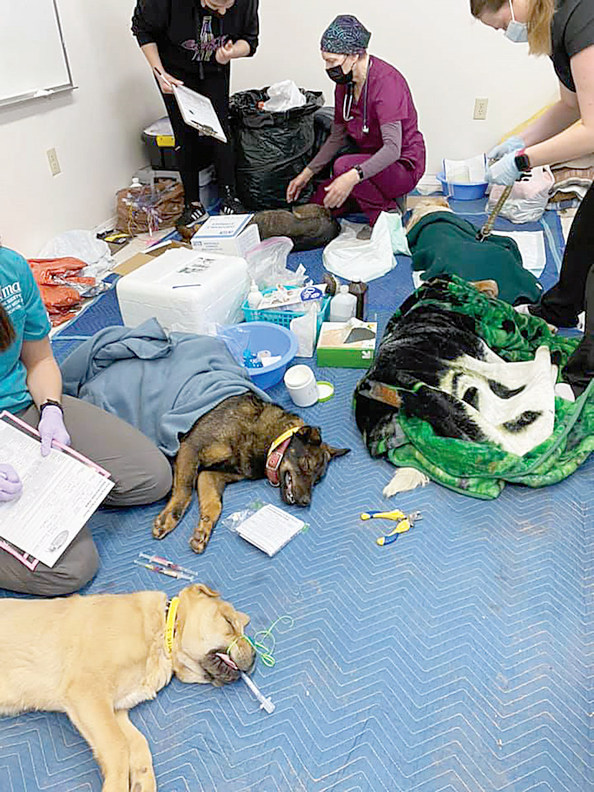
Founded in 2010, Fort Lupton- and Denver-based Soul Dog Rescue travels to rural communities on Native American lands to focus on reducing animal population by conducting mass spay and neuter clinics. The group believes that spaying and neutering will occur only when the service is nearly free or very convenient to local residents and their animals.
The non-profit works with volunteer veterinarians, vet techs, and others at no cost to the public, relying on donations to defray the costs of operating the pop-up clinics, pay for medications and supplies. The clinics are held in tribal chapter houses, community buildings, and schools, with a suggested donation of $10-$15 per animal rather than a set fee.
All animals are sterilized, dewormed, and vaccinated. Over the course of a typical weekend, from 75 to 150 animals will be sterilized, and the group will also take in abandoned, injured, unwanted, and stray animals.
When possible, Soul Dog Rescue works with Navajo National Animal Control to take in healthy, friendly animals that would otherwise be destroyed. In 2021, thirteen clinics have been scheduled from Chinle, Arizona to Monument Valley, Utah, along with small communities like Sanostee, New Mexico and Dilkon, Arizona.
A typical weekend was one in February 2021 in Rock Point, Arizona. Despite bad weather throughout the region, Soul Dog sterilized, vaccinated, and dewormed 115 animals in the small community, a location where the group had never held a clinic before.
The Navajo Lutheran Mission hosted the clinic and workers. The volunteers included a group that had arrived from Washington state, and others from Las Vegas, Prescott, Arizona; Denver, Fort Collins, and Grand Junction, Colorado. They also took in 31 animals surrendered by their owners that were then transferred back to Colorado to await new homes.
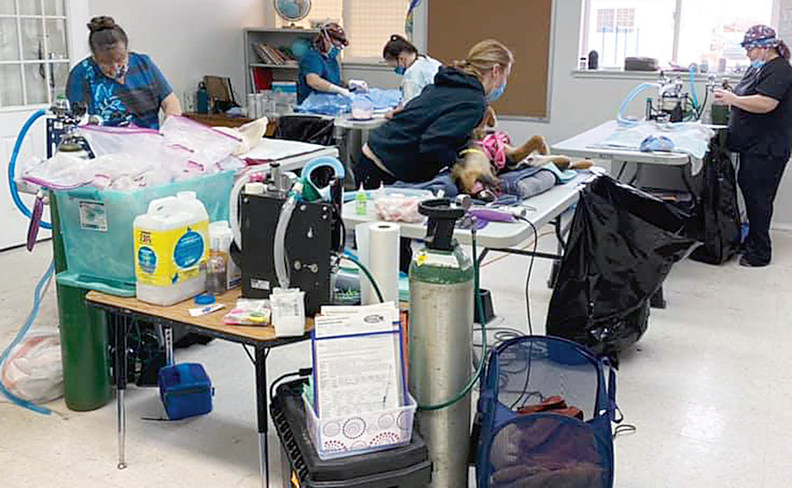
Soul Dog extends its reach even further by operating a clinic that opened in 2018 in Fort Lupton that offers spaying and neutering, vaccinations, and microchipping. It also wears a rescue hat as a temporary home for several hundred dogs and cats. A mobile clinic (actually a retrofitted Airstream Trailer) goes to the most remote areas where it is not feasible to conduct a pop-up clinic.
Each week, Soul Dog helps between 15-80 animals from Ute Mountain and the Navajo Nation on one of its runs to underserved tribal lands. Most of the intake is puppies being surrendered because of the lack of spay and neuter resources. Part of the cost of transport is covered from the proceeds of a thrift shop the group operates in Englewood, Colorado.
Soul Dog Rescue, 1245 Factory Circle, Fort Lupton, CO 80621. (303) 857-6789, souldog.org
Underdog Animal Rescue and Rehab
With much more limited resources, several small organizations have focused on a variety of rescue and adoption strategies, and a couple of them have been incredibly successful with little fanfare. Underdog Animal Rescue and Rehab, based in Moab, Utah, brings vehicles and crates to communities to round up stray and unwanted animals.
In January 2021, they traveled to Kayenta, Arizona where dozens of dogs and puppies can be found hanging out at gas stations and burger joints begging tourists for food. The animals are brought back to Utah where they are vaccinated and sterilized, and then placed for adoption through their Rescue Ranch.
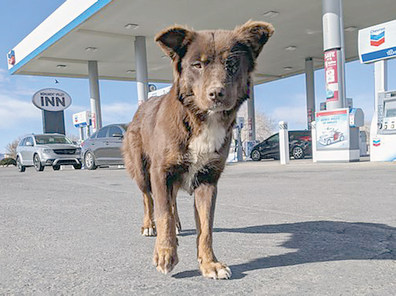
The group attributes the increasing number of stray animals to both a lack of access to veterinary services and money to pay for those services, even if they were available. Their plan is to operate an independent quarterly spay and neuter program for these communities and to encourage those who live outside the Navajo Nation to “Sponsor a Spay” with a $40 donation. The quarterly clinics will spay and neuter about 120 animals in communities where veterinary services are typically not available.
Back in Moab, the organization offers a “weekend sleepover” program that allows those who are unable to serve as fosters the opportunity to spend time with one of their rescue dogs.
In the sleepover, you check out a dog from their Rescue Ranch and can take it camping, back to your home for additional socialization, out for a hike, to the dog-friendly cafe or have a snuggle buddy. There’s no commitment to adopt – just a promise to give a dog some additional TLC, companionship, and a break from the shelter environment.
Underdog Animal Rescue, (435) 260-8861, underdogrescuemoab.org
Turquoise Paw of New Mexico
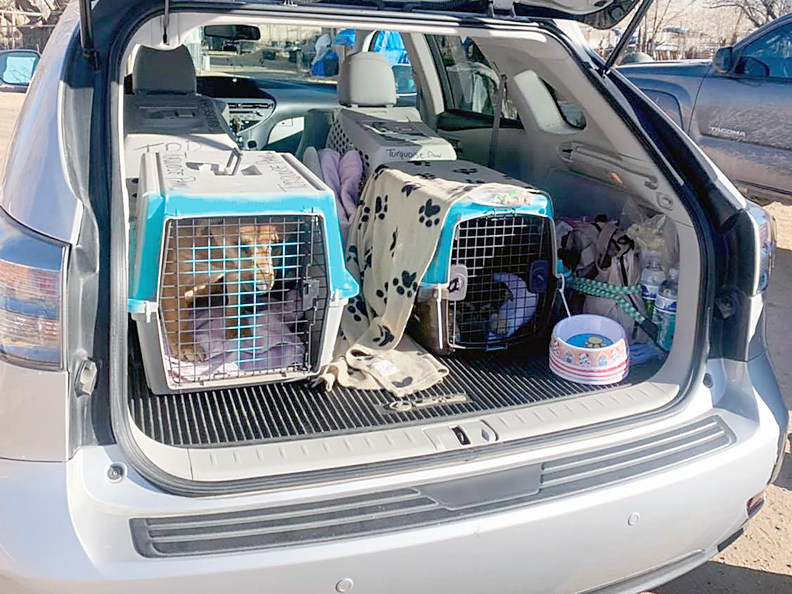
On the eastern side of the rez, Turquoise Paw of New Mexico operates like a more traditional rescue group, only with numbers that would startle those unfamiliar with the scale of the stray problem in this region.
They have a unique relationship with loyal private pilots who use their small airplanes to ferry dogs picked up from remote communities like Lukachukai, Tsalie, Dennehutso and Mexican Water to centralized meeting points in Shiprock and Farmington, New Mexico. From there, the pilots fly to Turquoise Paw’s rescue partners in towns like Durango, Cortez, Ridgway, and Montrose, Colorado.
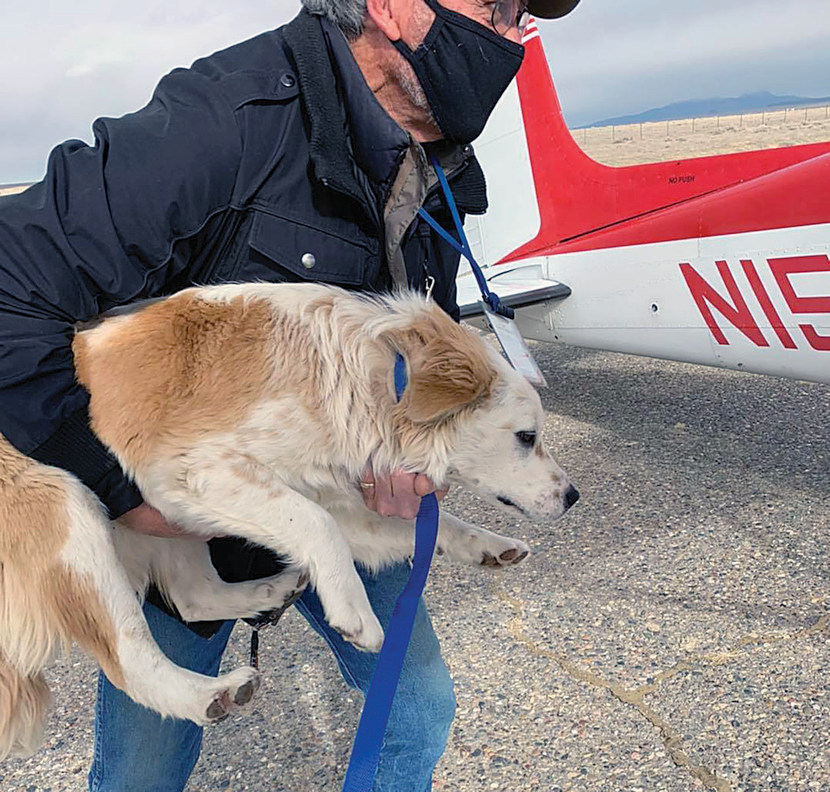
Other volunteers drive the animals that have been picked up as strays to rescue partners in Arizona where it seems there is always a demand for puppies. The numbers though, are staggering.
By mid-February 2021, the group had already rescued 600 animals, including a family of six puppies and their mom living in a small wooden box on unattended property that were sent to a rescue group in Arizona.
Turquoise Paw of New Mexico, (505) 374-4098, turquoisepawofnm@gmail.com
RezDawg Rescue
Colorado-based RezDawg Rescue expects to help over 2,000 animals from the underserved Four Corners area this year. Like most rez dogs, the ones they often pick up as strays or those unwanted by their owners are severely malnourished, sick, and injured.
It’s common for rescuers to bring in dogs suffering from diseases like parvo, those who have borne multiple litters, and others badly hurt after being hit by vehicles on remote reservation roads.
The cost of dealing with this type of animal demographic is extraordinary, even though the group has a cadre of dedicated volunteers willing to drive long distances on the Navajo Nation or the Zuni Pueblo. The animals typically have had no veterinary care and may need expensive treatment far beyond the vaccinate/spay-neuter regimen of animals in urban communities.
As a result of the pandemic, RezDawg Rescue estimates that its donations are down by over a third, while at the same time, animals with complex medical issues are on the rise.
RezDawg Rescue, PO Box 448, Lafayette, CO 80026, www.rezdawgrescue.org

